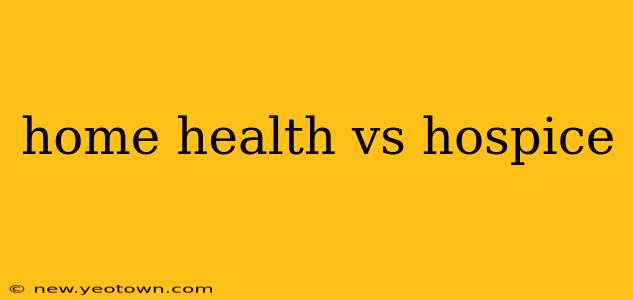Home Health vs. Hospice: Understanding the Differences
The transition of a loved one into a vulnerable health state often brings a wave of questions and decisions. Two common options that often cause confusion are home health care and hospice care. While both provide care in the familiar setting of home, they serve vastly different purposes and patient populations. Let's unravel the key differences to make informed choices during a challenging time.
What is Home Health Care?
Imagine your grandmother recovering from a hip replacement. She needs assistance with daily tasks like bathing, dressing, and meal preparation, along with physical therapy to regain her mobility. This is where home health care steps in. Home health care focuses on improving a patient's health status and promoting independence. It's geared towards individuals who are experiencing illness or injury but are still actively receiving treatment and aiming for recovery.
What is Hospice Care?
Now picture a grandfather with a terminal illness, his prognosis limited to months. His family focuses on ensuring his comfort and maximizing his quality of life during his remaining time. This is where hospice care comes into play. Hospice care concentrates on providing palliative care, focusing on pain management, symptom relief, and emotional support for patients with a life expectancy of six months or less. The focus shifts from curative treatments to ensuring comfort and dignity.
What are the Key Differences Between Home Health and Hospice?
The core differences lie in the goals of care, the patient's prognosis, and the types of services provided.
Goal of Care:
- Home Health: To improve health, regain independence, and return to a higher level of functioning.
- Hospice: To provide comfort, pain management, and emotional support during the end-of-life journey.
Patient Prognosis:
- Home Health: Patients are expected to improve and recover from their illness or injury.
- Hospice: Patients have a terminal illness with a life expectancy of six months or less (if the disease follows its normal course).
Services Provided:
- Home Health: Includes skilled nursing, physical therapy, occupational therapy, speech therapy, medical social work, and home health aides assisting with daily living activities.
- Hospice: Emphasizes pain and symptom management, emotional and spiritual support for patients and families, bereavement counseling for the family after the patient's death, and assistance with daily living needs.
How Do I Choose Between Home Health and Hospice?
The choice between home health and hospice is determined by the patient's health status and prognosis. A physician's assessment is crucial in making this determination. If your loved one is expected to improve and return to a higher level of functioning, home health care may be appropriate. If your loved one has a terminal illness with a limited life expectancy, hospice care would be a better option.
Can Someone Receive Both Home Health and Hospice Care?
No, generally not simultaneously. Home health services focus on curative or restorative care, which directly contradicts the palliative approach of hospice. However, there may be very limited circumstances where a temporary overlap is possible, but this must be carefully assessed by the physician and appropriate health care team.
What are the Costs of Home Health and Hospice Care?
The cost of both home health and hospice care varies based on the services needed and your insurance coverage. Medicare, Medicaid, and many private insurance plans cover a significant portion of both. It's essential to verify coverage with your insurance provider.
What if I Need More Information?
Navigating healthcare decisions for a loved one can be overwhelming. Don't hesitate to reach out to your physician, a social worker, or a hospice or home health agency for guidance. They can help you understand your options and make the best choice for your loved one's unique circumstances. Remember, open communication and a clear understanding of the available services are key to making informed decisions that ensure the best possible care for your family member.

